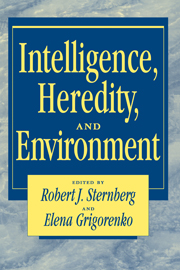Book contents
- Frontmatter
- Contents
- List of contributors
- Preface
- Part I The nature–nurture question: New advances in behavior-genetic research on intelligence
- 1 Behavior-Genetic and Socialization theories of intelligence: Truce and reconciliation
- 2 The puzzle of nongenetic variance
- 3 Identifying genes for cognitive abilities and disabilities
- 4 Heredity, environment, and IQ in the Texas Adoption Project
- 5 IQ similarity in twins reared apart: Findings and responses to critics
- Part II Novel theoretical perspectives on the genes and culture controversy
- Part III Specific issues in the nature–nurture controversy
- Part IV Integration and conclusions
- Name index
- Subject index
1 - Behavior-Genetic and Socialization theories of intelligence: Truce and reconciliation
Published online by Cambridge University Press: 05 June 2012
- Frontmatter
- Contents
- List of contributors
- Preface
- Part I The nature–nurture question: New advances in behavior-genetic research on intelligence
- 1 Behavior-Genetic and Socialization theories of intelligence: Truce and reconciliation
- 2 The puzzle of nongenetic variance
- 3 Identifying genes for cognitive abilities and disabilities
- 4 Heredity, environment, and IQ in the Texas Adoption Project
- 5 IQ similarity in twins reared apart: Findings and responses to critics
- Part II Novel theoretical perspectives on the genes and culture controversy
- Part III Specific issues in the nature–nurture controversy
- Part IV Integration and conclusions
- Name index
- Subject index
Summary
Theories should compete. It keeps them fit and trim. Left unchallenged, theories, like people, grow fat and lazy, and they eventually decay into shapeless blobs. Unchallenged theories petrify as “common wisdom,” immobilizing critical faculties with intellectually paralyzing assumptions. A challenged theory is a creative network of conscious and considered ideas, casting its nomological net over new observations and predicting where to look for the next catch.
Psychological theories are rarely made to compete, but they can, and they should, be exercised in this way. Competing theories about determinants of intellectual differences offer a challenging opportunity to test theoretically required predictions with available observations. Predictions about crucial research results are generated by Socialization Theory and by Behavior-Genetic Theory, and those predictions are quite different. The critical observations to test the adequacy of predictions from these competing theories have been made. Yet, there has been little, direct theoretical confrontation. That the theories have not been tested with existing data in a systematic fashion is either a sign of mutual ignorance or an aversion to being challenged.
This chapter presents Socialization and Behavior-Genetic theories of intelligence and evaluates the adequacy of the theories' predictions to account for existing observations. The adequacy of the theories to generate new research is also assessed. By posing a stark contrast between theories, I hope to sharpen the debate and to modify developmental theory to fit existing observations about intellectual resemblance in families and to be more productive in future research.
- Type
- Chapter
- Information
- Intelligence, Heredity and Environment , pp. 3 - 41Publisher: Cambridge University PressPrint publication year: 1996
- 12
- Cited by

